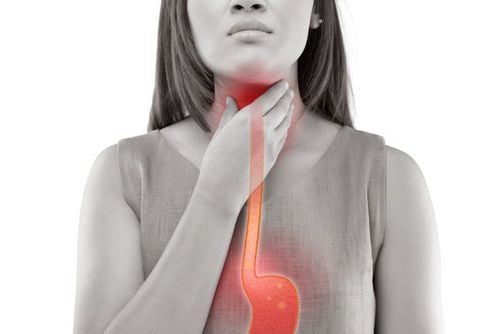This is an automatically translated article.
Nasopharyngeal cancer is malignant cancer that occurs in the oropharynx. Most of the cases are detected at a late stage because it is easily confused with common respiratory diseases. The disease also has a rapid growth rate that is life-threatening.1. Throat cancer-causing agents
1.1 Direct agents Healthy genes develop into mutant genes that cause cells to multiply uncontrollably. Consequences are invasion of surrounding structures, compression of other organs, long-term development will lead to metastasis. In nasopharyngeal cancer, the process usually begins in the squamous cells that line the surface of the oropharynx.1.2 Risk factors Tobacco abuse The components in tobacco smoke are the leading cause of oropharyngeal cancer. Users use long enough, toxins accumulate enough will lead to disease. Therefore, people who intend to smoke should stop thinking, smokers should use early cessation measures.
Alcohol abuse Toxic substances in alcohol also increase the risk of throat cancer. Alcoholics should use withdrawal measures early. Drinking too much alcohol and smoking doubles the risk of throat cancer. Therefore, it is necessary to combine alcohol and tobacco addiction to prevent diseases effectively.
Infection with papilloma virus (HPV 16 and HPV 18) Human papillomavirus (HPV) is a group of viruses associated with many different cancers, including nasopharyngeal cancer. The risk of disease is increased in the presence of HPV strains 16 and 18 in the oropharynx.
Epstein Barr virus EBV infection has been found in oropharyngeal cancer cells. Depending on the strain of EBV of the infected person, the risk of getting the disease also varies. Not everyone develops oropharyngeal cancer from an EBV infection.
Poor diet Unhealthy eating habits also increase the risk of throat cancer. A diet high in fried, processed, salted and fermented foods often not only increases the risk of throat cancer but also harms health. To balance, people with the above eating habits should combine with plant-based foods such as green vegetables, fruits, boiled dishes.
Genetic factors People with a family history of oropharyngeal cancer have a higher risk of developing oropharyngeal cancer than the general population. Therefore, these subjects need to have regular health check-ups to screen for oropharyngeal cancer.

Những người có tiền sử gia đình bị ung thư vòm họng thì có nguy cơ cao cũng bị ung thư vòm họng hơn người bình thường
Congenital digestive disorders Congenital digestive disorders can cause aplastic anemia, skin rashes, and abnormalities in fingernails and toenails. The risk of getting sick at a young age is very high, so patients also pay attention to regular health check-ups to detect abnormalities.
Polluted living environment People who work in environments that are often exposed to wood dust, paints, and toxic chemicals have a higher risk of developing oropharyngeal cancer than the general population. Therefore, during the health check-ups at work, employees need to ask for more screening tests for nasopharyngeal cancer.
Oral sex Oral sex increases the risk of contracting the virus that causes STIs, especially the HPV virus. Therefore, those who regularly have oral sex should have a gynecological examination to confirm the presence or absence of STIs. To minimize the risk of spreading the virus, couples should use protective measures such as using condoms during sex.
Gender The incidence of oropharyngeal cancer in men is 4 times higher than in women. This rate is strongly related to smoking and drinking habits in men.
Age Nasopharyngeal cancer has a long incubation period. Therefore, most people with nasopharyngeal cancer are in middle age or old age, and it is rare in young people.
2. Early signs of nasopharyngeal cancer

Ù tai là dấu hiệu sớm của ung thư vòm họng
Headache: Dull, spreading pain and usually only pain on one side. Tinnitus: Most patients have tinnitus on one side, which sounds like a tick. Nasal congestion: Usually one side of the nose is blocked, the degree of stuffiness increases over time, sometimes there is blood in the mucus. 2.2 Other signs Difficulty swallowing: Difficulty swallowing gets worse as the tumor increases in size Dry throat: Throat is dry and burning. This uncomfortable feeling can easily be mistaken for symptoms of chronic pharyngitis. Voice change: This symptom occurs when there is a tumor near the vocal cords. The extent of the change depends on how far the tumor has spread. Persistent cough: The patient has a persistent cough that is not cured by common cold medicines. Nosebleed: Bleeding from the nose of a unilateral nature, accompanied by bleeding. Swollen lymph nodes in the neck: Should there be cancer cells, the surrounding lymph nodes will swell. The size and severity of pain increases with the size of the tumor.
3. Measures to prevent oropharyngeal cancer

Hạn chế sử dụng rượu bia, thuốc lá (kể cả hút thuốc thụ động) và các chất kích thích
The package of screening, and early detection of oropharyngeal, pharyngeal, and laryngeal cancers at Vinmec International General Hospital includes:
Full range of necessary services for early detection of oropharyngeal cancer Detecting abnormalities When registering for the screening package, and early detecting cancer of the oropharynx, pharynx, larynx, customers will be screened for nasopharyngeal - hypopharyngeal - laryngeal cancer. through general otolaryngology examination with hard or soft endoscope; Software ultrasound, thereby detecting the disease early, improving the effectiveness of treatment, increasing the survival rate for patients.
You can find out more about the screening package and early detection of nasopharyngeal cancer as well as other service packages of Vinmec International General Hospital HERE.
MORE:
7 points to note to help prevent oropharyngeal cancer Throat cancer in women: What you need to know How to detect nasopharyngeal cancer early?













